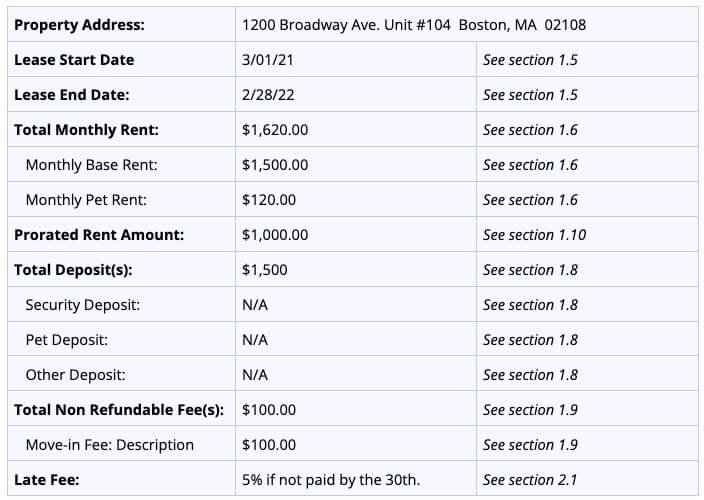Table of Contents
- Massachusetts Renters’ Rights and Landlord Responsibilities
- Massachusetts Landlords’ Rights and Tenant Responsibilities
- Criminal Background Checks
- Application Fee
- Security Deposit
- Disclosures
- Massachusetts Lease Agreement
- Massachusetts Landlord-Tenant Law FAQ
- Due Diligence and Massachusetts Rental Laws
- Massachusetts Landlord-Tenant Law Resources
Massachusetts ranks number one in education, number seven in the economy, and the number eight state overall, making it a great place to live and invest in rental properties.
Laws that impact the rental market, landlords, and tenants are constantly being decided in states. Make sure you know what’s on your ballot – find Massachusetts voting information.

Massachusetts Renters’ Rights and Landlord Responsibilities
- Have 30 days to return security deposit
- A 30-day notice required before raising rent
- Must give a 24-hour notice before entering
- Required to make repairs within 14 days
When it comes to Massachusetts rental laws, there are a few specifics landlords need to know:
- Security Deposit – Massachusetts limits the amount a landlord may charge for the security deposit to the equivalent of one month’s rent. Landlords must return the deposit within 30 days of the tenant moving out.
- Raising Rent – Landlords in Massachusetts may increase the rent to any amount for any reason with a 30-day notice.
- Notice of Entry – Massachusetts does not require a notice from the landlord before entering the property. However, landlords with property in the commonwealth must give 24-hour notice.
- Repairs – It is the landlord’s responsibility to keep the rental in safe and healthy living conditions. Landlords must make repairs within 14 days after being notified by the tenant. If the landlord fails to make repairs within this time frame, tenants may make the repairs themselves and deduct the cost from future rent payments.
- Rental Applications – Landlords must have permission for the state’s Criminal History Systems Board to ask about criminal history on rental applications. When a landlord with standard access requests a report, it may include criminal cases still occurring; convictions for a misdemeanor when the conviction date or incarceration release date is less than 5 years prior to the CORI request date; conviction for a felony when the conviction date or incarceration release date occurred less than 10 years prior to the CORI request date; and/or convictions for murder, manslaughter, or sex offense, no matter how old.
- Landlords must not get any sealed cases, cases with no conviction, misdemeanor convictions more than 5 years old, felony convictions more than 10 years old, juvenile cases if a person is younger than 17 and they were not convicted as an adult, civil cases, or non-incarcerable cases (arrests).
Massachusetts Landlords’ Rights and Tenant Responsibilities
- Tenants have 14 days to pay rent after they receive a notice
- Must give a 30-day notice before terminating a lease
- Tenants must keep the unit in a safe and habitable condition
- Landlord must store abandoned property for 60 days
Overdue Rent – If a tenant fails to pay rent on time, the landlord must give them a 14-day notice to pay or quit. If the tenant fails to pay, the landlord may file for eviction.
Terminating a Lease – If a tenant needs to terminate a month-to-month lease, they must give the landlord a 30-day notice.
Tenant Responsibilities – Tenants are required to keep the property clean, not disturb neighbors, and make small repairs.
Abandoned Property – If a tenant moves out and leaves personal property, the landlord must notify them and store the property for a minimum of 60 days. After this period, if the ex-tenant has not claimed it, the landlord may dispose of it how they see fit.
Criminal Background Checks
- HUD (Federal) laws do not classify criminal backgrounds as a protected class, but making a decision to rent based off a criminal background alone could lead to a discrimination charge as it impacts certain protected groups of people disproportionately.
- However, if the criminal background check revealed a crime for the manufacture and distribution of drugs, homicide and/or stalking, denying the application is allowed.
- Landlords should have a consistent and equal policy/procedure in place to follow regarding criminal background checks so as not to discriminate against one class of people over another.
- HUD states that a landlord cannot ask about arrest records, only convictions, as innocent people are commonly arrested though the situation may not have resulted in a conviction.
Application Fee
It is illegal for a landlord to charge application fees in Massachusetts.
Security Deposit
After one year, the security deposit must be held in an interest-bearing account at 5% or the actual rate charged by the bank. Receipts must be given for all security deposits collected showing the date received, amount, tenant’s name, and the location of rental unit.
Disclosures
- Landlords must disclose the bank’s name and address along with the account number where security deposits are held.
- Fire insurance information, if requested by tenant, describing the name of insurance company that insures rental property against damage or loss by fire, the amount of insurance, and the name of individual who would receive payment for the loss covered by the insurance company must be shared if requested.
- Landlords must provide a move-in checklist with the state law notice below in 12-point, bold-faced text:
This is a statement of the condition of the premises you have leased or rented. You should read it carefully in order to see if it is correct. If it is correct you must sign it. This will show that you agree that the list is correct and complete. If it is not correct, you must attach a separate signed list of any damage which you believe exists in the premises. This statement must be returned to the lessor or his agent within fifteen days after you receive this list or within fifteen days after you move in, whichever is later. If you do not return this list, within the specified time period, a court may later view your failure to return the list as your agreement that the list is complete and correct in any suit which you may bring to recover the security deposit.
Build a Massachusetts lease agreement with all of the required disclosures in less than 15 minutes.
Massachusetts Lease Agreement
There are three sections to a residential lease agreement. The first section outlines the custom details of the contract, such as who’s involved and for what address. Here’s an example Massachusetts lease agreement listing details found in Section 1:
Massachusetts Landlord-Tenant Law FAQ
Below are answers to some of the most commonly-asked questions when it comes to landlord-tenant laws in Massachusetts:
Can You Withhold Rent in Massachusetts?
The only instance where a tenant may withhold rent is if a landlord fails to make requested repairs. Tenants may pay for the repairs themselves and deduct the cost from the following rent payments.
How Long Does it Take to Evict a Tenant in Massachusetts?
Evicting a tenant in Massachusetts can take anywhere from one to three months, depending on the reason for eviction.
Is Massachusetts a Landlord-Friendly State?
Massachusetts commonwealth is not very landlord-friendly because of the restrictions on fees and entry. However, Massachusetts does not have the same policies, so it comes down to what part of the state you are in.
What is the Eviction Process in Massachusetts?
There are four reasons a landlord may file for eviction in Massachusetts. The four reasons include failure to pay rent, violation of the lease agreement, the end of the lease term, and illegal activity. Depending on the violation, the landlord must give the tenant notice and anywhere from 7 to 30 days to cure their violation.
If the tenant fails to cure or quit, then the landlord may file a complaint with the court, which costs $120 – $180. After the complaint is filed, it will be served to the tenant 7 to 30 days before the hearing.
After the tenant is served with the summons, the hearing will be scheduled within 10 to 16 days.
If the court rules in favor of the landlord, then a writ of execution will be issued ten days later. The tenant will have 48 hours to a few days to move out.
How Much Notice Does a Landlord Have to Give a Tenant to Move Out in Massachusetts?
Landlords must give a 14-day notice before asking a tenant to vacate the property.
Due Diligence and Massachusetts Rental Laws

Disclaimer: TurboTenant, Inc does not provide legal advice. This material has been prepared for informational purposes only. All users are advised to checkall applicable local, state, and federal laws, and consult legal counsel should questions arise.
Massachusetts Landlord-Tenant Law Resources
Massachusetts Fair Housing Resources
Other State Resources
- Tenant Rights and Responsibilities
- Massachusetts Law about Landlord and Tenant
- Landlord Rights and Responsibilities
- Good Neighbors Handbook – A Guide for Boston Landlords and Tenants
- Attorney General’s Guide to Landlord/Tenant Rights
Massachusetts Associations
Federal Fair Housing Resources






